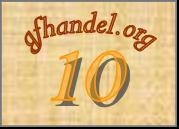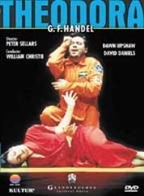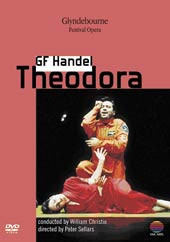Here is a chance to purchase a
record of one of the finest stagings of ‘opera’ in the late twentieth
century. Without a doubt, Theodora at Glyndebourne was an astonishing
success: the critics raved, it was a sell-out, and it won many converts to
Handel as a dramatic composer of the first rank. A
review of William Christie’s musical interpretation of this oratorio is
already on gfhandel.org (albeit with a differ cast), so this review
considers visual presentation. First, the challenges. What Sellars has
chosen to stage is essentially unstageable. Where else in music is there a
piece that concerns itself with powerful people demanding obedience to the
State and how other people, through their actions, demonstrate that private
conscience and belief cannot be subordinated to secular authority? This all
sounds unpromising drama. Morell and Handel between them produced a flawless
work of art, and this staging, though contrary to the character of unstaged
oratorio, is a theatrical triumph because it is constantly true to its
spirit.
Secondly, the solutions. It
is an interesting artistic endeavour for a director of the stage version of
a drama to direct it for video. He cannot hope to capture the total visual
spectacle he arranged for the theatre audience because he cannot give a view
of the whole stage and its contents, conductor, players, and audience.
Instead, we are given exactly what the director wants his video audience to
see. He chooses either long-shots or following-shots for us to get a sense
of the whole, medium-close-ups for groups, or close-ups of individuals at
moments of intensity; we get broader views of the chorus when they take over
from the soloists. This director is rightly self-indulgent, selecting his
favourite moments for sustained visual concentration. Sellars avoids those
details we involuntarily see when a chorus member scratches her nose, a
principal moves awkwardly into position, or orchestral players waiting their
next turn.
The key aspect of this
staging is its simplicity. There are no spectacular effects, no magnificent
ensembles or crowd scenes; the scenery is abstract, formed of ‘bottles’ of
various sculptural shapes that are moved at private moments in the drama to
create new still-lifes. Their ‘fragility’ is a metaphor for political power
(in Act 3 Valens has them as a backdrop). Manhandling the scenery creates
moments of silent tension in which the audience has to reflect on what is
going on and what these shapes and their positioning can possibly mean.
Sellars gives us a winning lesson in semiotics, with signs abounding in the
gestures, grouping, costumes, ‘scenery’, and the lighting, and with which
Sellars masterfully manipulates the video audience. See how his chorus
performs in real time, how they enter into shot, miming conversation, moving
around and sitting down in the apparently haphazard manner of unstaged
people. But when they sing, their verismo acting gives way to choral miming
and extravagant gestures. Somehow it all works; it convinces by the force of
the commitment of everyone involved. When the camera is on them, no one
blinks. To prevent our getting bored, the director observes the commonplace
precept of media that eight seconds is the maximum span for each unmoving
shot.
A review should not be an
essay, so a few details and examples will have to suffice to illustrate the
delight that this recording affords. Sellars shows an unerring knack for
representing impotent frustration --- from Septimius’s struggles to
understand Christian motives, to Valens’s exasperation in Act 3. Though Act
2 begins in over-the-top vein, it sobers up for Theodora’s prison scene,
which Sellars stages in a ‘cage’ of light surrounded by darkness, with no
theatrical window bars or walls. Theodora circles her ‘cage’ as if a fretful
animal. Irene breaks this illusion by singing as if in a dream that Theodora
is having. Touches of this forceful kind flourish in this staging. The way
that Lorraine Hunt sings Irene is a welcome reminder that Handel often
employed singing actresses, no doubt because of their ability to animate
their parts and inject into his music a personality that was truthful to the
character. In this production the singers, all of them, are excellent actors
of the sentiments they sing.
Striking tableaux feast the
eyes. ‘As with rosy steps the morn’ is played against a dim stage with Irene
centre stage, her gestures accompanying the words. And it must be noted that
all actions by all characters in this staging arise from the words, not the
music, which is the key to Sellars’s success. There are odd indulgences on
the way, though, such as the syringe metaphor, first seen in close-up when
morphine is prepared for Valens during his phony heart-attack, and when it
reappears to be administered as an analgesic to the doomed Christian couple
at the end of the drama.
The finest moments on this
video occur at the end. The chorus ‘How strange their ends’ is one of
visible stupefaction. We see a demonstration of Spinoza’s lesson that when
vanquished by love hate passes into love. The final duet and chorus are
emotionally draining --- no participant on stage appears to escape from the
same purging of the emotions, and Sellars does not take our eyes away from
the scene for a moment. In our painful world the passing of hate into love
is an antidote to the paralysis of utter despair --- look at Irene’s face,
in the last shot we get of her, as she looks up in hope. Handel, Morell,
Sellars, singers, players and theatre designers, Stoicism, Erastianism, the
teachings of the early fathers of the Church, anti-Deists, all superbly
blend in a masterpiece of music-drama. This DVD Theodora will never
be surpassed.
1996
Interview with Peter Sellars



